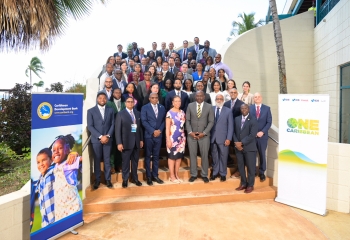CDB Launches The Minimum Regulatory Function Report to Strengthen Environment for Renewable Energy Investment

The Caribbean Development Bank (CDB) has released a publication titled The Minimum Regulatory Function for the Electricity Sector in Caribbean Countries, aimed at assisting its Borrowing Member Countries (BMCs) strengthen and reform their regulatory frameworks to better facilitate private investments in renewable energy.
The report is the first in a series to be provided under the Bank’s Accelerated Sustainable Energy and Resilience Transition 2030 (ASERT-2030) Framework, a key strategy of the CDB’s Energy Sector Policy and Strategy, aimed at encouraging and supporting BMCs to pursue, expedite and scale-up investments in renewable energy.
Coordinator of the CDB’s Sustainable Energy Unit, Mr Joseph Williams, said the series will add to the existing body of knowledge that addresses challenges associated with implementing sustainable energy activities and strengthen the Bank's leadership role in the sector.
“This publication demonstrates the Bank's commitment to sustainable energy and is a very important milestone, as it was a key recommendation emerging from the very robust regional regulatory ASERT-2030 Dialogue held earlier this year among stakeholders, including BMCs, regulators, utilities, and regional and international partners. It is therefore reflective of meaningful engagement and strong consensus,” he said.
The MRF, released on Tuesday, October 17, includes key elements that should provide clarity, certainty, and transparency to potential private renewable energy investors. It will be used as a benchmark for identifying existing gaps within the regulatory frameworks of BMCs and defining the reforms and capacity-strengthening needs that CDB and other financiers will support.
While CDB is providing initial leadership for this intervention, the intention is for other relevant regional agencies to provide management and coordination of subsequent reform and capacity-strengthening work to complement other interventions within the sector.
The MRF aims to position Caribbean countries to tackle the persistent problem of inadequacy within the electricity sector enabling framework, spur improvement, significantly de-risking the sector and help unlock lower-cost private investments in renewable energy to help BMCs meet their energy security objectives, climate change targets and build resilience in the region.


